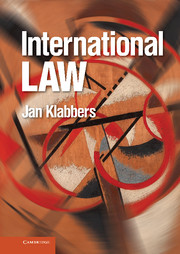Book contents
- Frontmatter
- Contents
- Detailed table of contents
- Table of cases
- Preface
- List of abbreviations
- Part I The structure of international law
- 1 The setting of international law
- 2 The making of international law
- 3 The law of treaties
- 4 The subjects of international law
- 5 Jurisdiction, powers and immunities
- 6 The individual in international law
- 7 The law of responsibility
- 8 International courts and tribunals
- 9 Sanctions, countermeasures and collective security
- Part II The substance of international law
- Part III The surroundings of international law
- Bibliography
- Index
- References
8 - International courts and tribunals
from Part I - The structure of international law
- Frontmatter
- Contents
- Detailed table of contents
- Table of cases
- Preface
- List of abbreviations
- Part I The structure of international law
- 1 The setting of international law
- 2 The making of international law
- 3 The law of treaties
- 4 The subjects of international law
- 5 Jurisdiction, powers and immunities
- 6 The individual in international law
- 7 The law of responsibility
- 8 International courts and tribunals
- 9 Sanctions, countermeasures and collective security
- Part II The substance of international law
- Part III The surroundings of international law
- Bibliography
- Index
- References
Summary
INTRODUCTION
The sovereignty of states means that it has been considered very difficult to hold states to account before a court. This is still reflected in the idea that states enjoy sovereign immunities in domestic law, one of these being immunity from prosecution; as we have seen in an earlier chapter, states cannot be held to account in the courts of another state for their official acts.
If states cannot be held to account before a domestic court, it stands to reason that their acts can be adjudged before international tribunals, but this has taken a long time to develop. States have been reluctant to subject themselves to the jurisdiction of international tribunals and, by and large, continue to be reluctant to do so. While international courts are quite numerous in the early twenty-first century (at the latest count, there are some 125 in existence, in all sorts and varieties), adjudication took a long time to develop and is still often considered as onerous. States tend to prefer to settle their differences by political means, and in a sense, this is as it should be; much as in private relations between individuals, courts should be a medium of last resort. This chapter will discuss briefly dispute settlement by political means, discuss arbitration and, at considerable length, discuss the ICJ.
- Type
- Chapter
- Information
- International Law , pp. 140 - 164Publisher: Cambridge University PressPrint publication year: 2013



